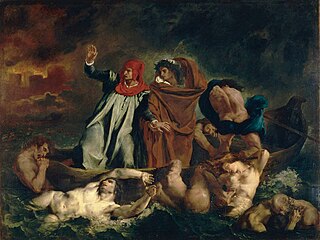This is a list of films based on Slavic mythology .
| Title | Release date | Notes |
|---|---|---|
| The Humpbacked Horse | 1947 | USSR - animation |
| The Magic Sword | 1950 | Yugoslavia |
| Sadko | 1953 | USSR |
| Old Czech Legends | 1953 | Czechoslovakia - animation |
| Ilya Muromets | 1956 | USSR |
| Jack Frost | 1964 | USSR |
| The Tale of Tsar Saltan | 1966 | USSR |
| Viy | 1967 | USSR |
| Lokis | 1970 | Poland |
| Ruslan and Ludmila | 1972 | USSR |
| Leptirica | 1973 | Yugoslavia |
| A Ballad About Green Wood | 1983 | Czechoslovakia - animation |
| The Tale of Tsar Saltan | 1984 | USSR |
| Little Otik | 2000 | Czech Republic |
| The Hexer | 2001 | Poland |
| An Ancient Tale: When the Sun Was a God | 2003 | Poland |
| Dobrynya Nikitich and Zmey Gorynych | 2006 | Russia - animation |
| Prince Vladimir | 2006 | Russia - animation |
| Wolfhound | 2006 | Russia |
A Cyclops is a one-eyed monster in Greek mythology.

Fantasy films are films that belong to the fantasy genre with fantastic themes, usually magic, supernatural events, mythology, folklore, or exotic fantasy worlds. The genre is considered a form of speculative fiction alongside science fiction films and horror films, although the genres do overlap. Fantasy films often have an element of magic, myth, wonder, escapism, and the extraordinary. Prevalent elements include fairies, angels, mermaids, witches, monsters, wizards, unicorns, dragons, talking animals, ogres, elves, trolls, white magic, gnomes, vampires, werewolves, ghosts, demons, dwarves, giants, goblins, anthropomorphic or magical objects, familiars, curses and other enchantments, worlds involving magic, and the Middle Ages.
Papa is a word used in many languages as an affectionate term for father.
This is a list of lists of dragons.

Classical mythology, classical Greco-Roman mythology, Greek and Roman mythology or Greco-Roman mythology is both the body of and the study of myths from the ancient Greeks and ancient Romans as they are used or transformed by cultural reception. Along with philosophy and political thought, mythology represents one of the major survivals of classical antiquity throughout later Western culture. The Greek word mythos refers to the spoken word or speech, but it also denotes a tale, story or narrative.
There are a number of lists of fictional species:
This is a list of "film lists".
The Norse mythology, preserved in such ancient Icelandic texts as the Poetic Edda, the Prose Edda, and other lays and sagas, was little known outside Scandinavia until the 19th century. With the widespread publication of Norse myths and legends at this time, references to the Norse gods and heroes spread into European literary culture, especially in Scandinavia, Germany, and Britain. In the later 20th century, references to Norse mythology became common in science fiction and fantasy literature, role-playing games, and eventually other cultural products such as Japanese animation. Storytelling was an important aspect of Norse mythology and centuries later, with the rediscovery of the myth, Norse mythology once again relies on the impacts of storytelling to spread its agenda.
The large amount of material within the scope of "fiction and myth" has been divided into the following:

Norse or Scandinavian mythology is the body of myths of the North Germanic peoples, stemming from Norse paganism and continuing after the Christianization of Scandinavia, and into the Scandinavian folklore of the modern period. The northernmost extension of Germanic mythology and stemming from Proto-Germanic folklore, Norse mythology consists of tales of various deities, beings, and heroes derived from numerous sources from both before and after the pagan period, including medieval manuscripts, archaeological representations, and folk tradition.
Myth is a folklore genre consisting of narratives that play a fundamental role in a society, such as foundational tales or origin myths. Since the term myth is widely used to imply that a story is not objectively true, the identification of a narrative as a myth can be highly controversial: many adherents of religions view their own religion's stories as true, and therefore object to those stories being characterized as myths, while seeing the stories of other religions as being myth. As such, some scholars label all religious narratives as myths for practical reasons, such as to avoid depreciating any one tradition because cultures interpret each other differently relative to one another. Other scholars avoid using the term "myth" altogether and instead utilize different terms like "sacred history", "holy story", or simply "history" to avoid placing pejorative overtones on any sacred narrative.

The Western classical tradition is the reception of classical Greco-Roman antiquity by later cultures, especially the post-classical West, involving texts, imagery, objects, ideas, institutions, monuments, architecture, cultural artifacts, rituals, practices, and sayings. Philosophy, political thought, and mythology are three major examples of how classical culture survives and continues to have influence. The West is one of a number of world cultures regarded as having a classical tradition, including the Indian, Chinese, and Islamic traditions.

The following outline offers an overview and guide to LGBT topics.